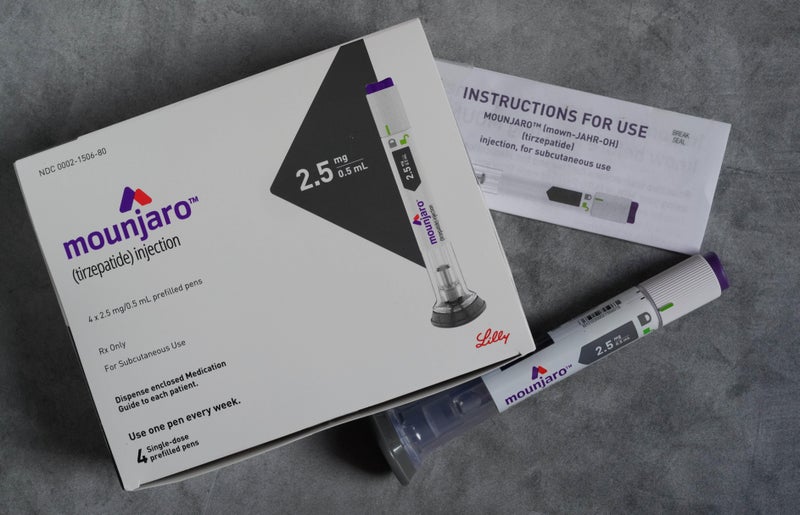What experts say about the blue dye RFK Jr seemed to put in his water
What experts say about the blue dye RFK Jr seemed to put in his water
Share:
Here’s what the science says about the supplement’s cancer-fighting properties. U.S. Secretary of Health nominee Robert F. Kennedy Jr. has been filmed seemingly putting a blue liquid into a glass of water while on a flight. While it has not been confirmed exactly what the liquid was, many social media users have claimed it was methylene blue — a synthetic blue dye. Methylene blue is among a range of health supplements that have become popular in the past few years. Many are turning to pills, powders, plants and tinctures to boost their wellbeing and ward off serious diseases, like cancer.
![[RFK Jr was recorded administering a mysterious blue liquid into his drink on a flight]](https://static.independent.co.uk/2025/02/06/13/18/Screenshot-2025-02-06-at-13-12-57.png)
It makes sense that people are drawn to these products — after all, who wouldn’t want to reduce their risk of illness, simply by adding something to their food?. But the efficacy of health supplements and their effect on cancer risk, prevention and treatment is far more complicated than most people realise. Dietary supplements come in a wide variety of forms, including vitamins, minerals, herbs and other substances – and it’s a multi-billion pound industry. Often fuelled by marketing claims and anecdotal evidence from friends, family members and celebrity wellness gurus who swear by certain supplements, many people take them with the belief that they can fill nutritional gaps in their diet or provide additional health benefits.
![[Mel Gibson has become famous for his controversial outbursts]](https://static.independent.co.uk/2023/09/21/08/newFile.jpg)
However, when it comes to cancer prevention and treatment, the scientific evidence supporting the use of supplements is mixed and often inconclusive. The world of supplement research is vast and complex, with studies often producing conflicting results. Some smaller studies have suggested potential benefits of certain supplements in cancer prevention but large scale, randomised clinical trials – considered the gold standard in medical research – have often failed to show significant benefits of supplement use in cancer prevention. In fact, some studies have even shown potential harm from certain supplements.
![[Practices like yoga can help to manage stress]](https://static.independent.co.uk/2025/01/31/10/31090429-ee0a6778-3047-4cdf-87fb-16d698f2901f.jpg)
For example, the Selenium and Vitamin E Cancer Prevention Trial tested whether these supplements could reduce the risk of prostate cancer. Contrary to expectations, the study found that vitamin E supplementation could increase the risk of prostate cancer, especially in healthy, young men. Similarly, studies on beta carotene supplements showed an increased risk of lung cancer in smokers. These findings highlight the importance of approaching supplement use with caution – more is not always better when it comes to nutrients.
Celebrities and social media influencers often recommend health supplements and make baseless claims about their potential to reduce cancer risk. For example, thanks to wellness influencers and Mel Gibson – who’s now as famous for his controversial outbursts as he is for his acting – the synthetic dye methylene blue has attracted attention on social media for its use as a cancer-fighting supplement. While methylene blue does have legitimate medical uses – and has shown some promise in certain areas of cancer research – it’s crucial to approach these claims with a healthy degree of scepticism.
In cancer research, methylene blue has shown potential as a “photosensitiser” in treatments using laser light – meaning it makes certain cancer cells more vulnerable to treatment. However, it’s important to stress that these are specific medical applications under controlled conditions, not a general cancer prevention strategy that can be applied broadly through supplement use. Claims about methylene blue as a cancer-preventing supplement are not supported by robust scientific evidence. In fact, long-term toxicity studies onmethylene blue have shown mixed results, with some animal studies suggesting potential risks at high doses.
This underscores the importance of not misinterpreting preliminary research or specific medical applications as justification for casual supplement use. When considering the role of supplements in cancer prevention, it’s essential to adopt a holistic view of health and wellbeing. This approach considers the whole person – body, mind and spirit – rather than focusing on individual components or symptoms.
One of the most important elements of this approach is nutrition. Rather than relying on supplements, people should aim to meet their nutritional needs through a varied, balanced diet rich in fruits, vegetables, whole grains and lean proteins. This approach not only provides essential nutrients but also offers the benefits of fibre, phytochemicals and other compounds found in whole foods that may work together to promote health.
Regular physical activity is another crucial component of a holistic approach to cancer prevention. Numerous, large, well-conducted studies have consistently linked regular exercise to lower cancer risk, as well as improved overall health and wellbeing. Exercise helps maintain a healthy weight, reduces inflammation and may have direct effects on cancer cell growth and proliferation. Practices such as mindfulness, meditation, yoga, or deep breathing exercises can help manage stress and promote overall wellbeing.
















